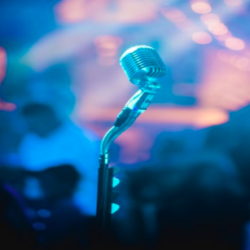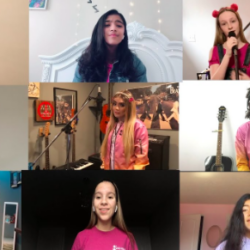How COVID-19 Impacted the Music Industry: AI, Virtual Concerts, and New Fan Experiences
The COVID-19 impact on the music industry has been profound and far-reaching. It forced artists, promoters, and the entire music ecosystem to rethink how music is created, shared, and monetized. As live venues closed and tours were canceled, the industry had to quickly adapt. From the rise of AI-generated music to the surge in virtual concerts and new event formats, the COVID-19 impact on the music industry is reshaping how music will be made and enjoyed in the future.
1. The Boom of AI Music in the Pandemic
One of the most significant effects of the COVID-19 impact on the music industry has been the rapid growth of artificial intelligence in music creation. AI tools like OpenAI’s Jukebox use deep learning to analyze vast amounts of music data. They can compose new songs in the style of popular artists, such as JAY-Z or The Beatles. This technology is no longer just experimental; it has become a vital part of how the industry innovates during the pandemic.
Moreover, with live shows canceled worldwide, artists and record labels turned to AI to better understand listener preferences. This technology helps identify trending styles and produces music tailored to audience tastes. It can also remix existing songs or collaborate creatively with human musicians, opening exciting new avenues for revenue and creativity. Therefore, AI represents one of the clearest examples of how the COVID-19 impact on the music industry has accelerated digital transformation.
2. Decline of Traditional Concert Experiences
Social distancing rules and quarantine restrictions led to massive cancellations and postponements of concerts, tours, and festivals worldwide. This sudden stop cut off one of the music industry’s most important income sources. Many artists, crew members, and venue staff faced financial uncertainty. The COVID-19 impact on the music industry here is not just financial but also deeply emotional, as live shows are often the heart of fan-artist connection.
Furthermore, personal experiences like meet-and-greets, backstage access, and the energy of live crowds were put on indefinite hold. These moments build fan loyalty and a sense of community. As the pandemic drags on, the industry has turned toward hybrid models. These combine smaller in-person events with live streaming to keep audiences engaged. Such models are essential responses to the ongoing COVID-19 impact on the music industry, balancing safety concerns with the need for connection.
3. The Internet’s New Role in Music Engagement
The COVID-19 impact on the music industry also shifted the focus heavily toward online platforms. Digital engagement became the primary way artists connect with fans. Instagram Live, YouTube, and TikTok saw explosive growth in music-related content. A prime example is the Verzuz Instagram Live battles, created by producers Swizz Beatz and Timbaland. These events featured legendary artists competing in friendly “battles,” drawing hundreds of thousands of viewers.
This online phenomenon demonstrated how the internet has become a vital space for music experiences, especially during lockdowns. It also shows how the COVID-19 impact on the music industry pushed artists to embrace technology to maintain relevance and build community.
4. Innovative Concert Experiences: The Drive-In Model
Even as vaccines become more widely available, live music experiences will likely never be the same. In response to the COVID-19 impact on the music industry, new concert formats have emerged. For example, Denmark recently hosted drive-in concerts, allowing fans to enjoy live shows from the safety of their cars. This format respects social distancing while providing a shared live music experience.
Such innovations cater to audience concerns about crowded venues and demonstrate the industry’s resilience. Drive-in shows and other socially distant formats may become permanent fixtures. These changes underline how the COVID-19 impact on the music industry is driving long-term shifts in how concerts are planned and experienced.
Virtual Concerts: A New Frontier
Amid these sweeping changes, virtual concerts have emerged as a lifeline. Canyon Entertainment Group responded to the COVID-19 impact on the music industry by launching a virtual concert series. This platform connects artists with fans safely, offering live performances from home studios to living rooms worldwide.
Virtual concerts provide a crucial way to sustain music culture during ongoing restrictions. They also demonstrate how digital fan engagement and new revenue models are becoming essential. As the COVID-19 impact on the music industry continues, virtual shows will likely remain a popular and valuable option for artists and audiences alike.
In summary, the COVID-19 impact on the music industry has been transformative. From AI-powered music production to virtual and drive-in concerts, the pandemic has permanently changed how artists create, perform, and connect with fans. This new era presents challenges but also unprecedented opportunities for innovation and growth.
Canyon Entertainment Group proudly contributes to this evolving music landscape. By organizing live streams, promoting local talent, and offering music training, they help keep the spirit of music alive during these challenging times.
Follow us on social media:
👉 https://www.linkedin.com/company/canyon-entertainment-group/
👉https://www.facebook.com/CanyonEntertainmentGroup/
Read more Blogs from Canyon Entertainment Group
High-Profile Artists Cut Ties with Spotify Over COVID Misinformation
Read more article: Spotify Embraces a Work-From-Anywhere Model



